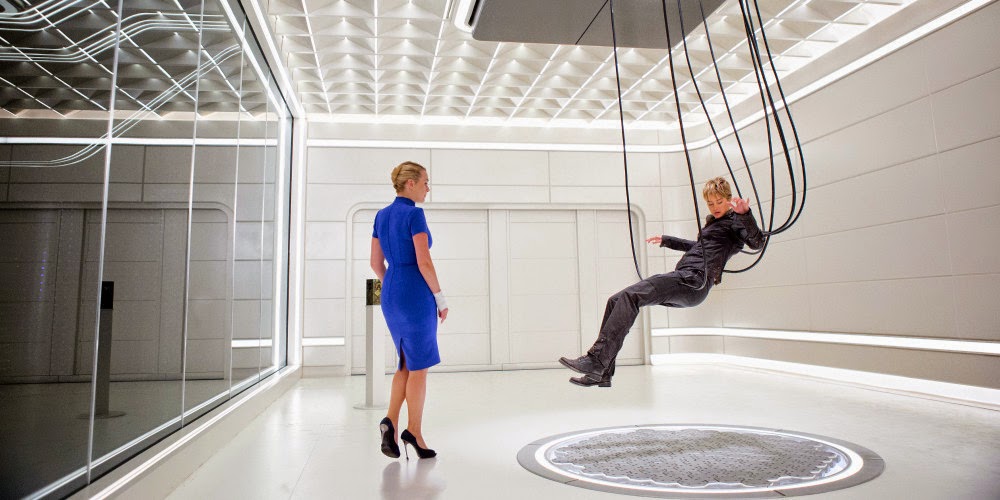When did young-adult movies become so childish? Look, it makes perfect sense that adaptations of YA fiction have experienced a boom at the multiplex. Teenagers go to the movies in droves, and so studios are constantly scrounging for the next mega-franchise, hoping to transform fantastical allegories into real profits. And when done right—as in the Harry Potter movies (the subgenre’s preeminent jewel) and, to a lesser extent, the Hunger Games films— these properties can be artistically valuable as well as commercially successful. The problem with Insurgent, the second installment in the Divergent series (based on a trio of novels by Veronica Roth), isn’t that it’s set in another futuristic dystopia or that it’s populated primarily by blandly attractive adolescents. The problem is that it’s dumb.
Part of my issue with Insurgent may be that I’ve never read any of Roth’s novels. Perhaps if I were familiar with the source material, I’d be more responsive to the gibberish about “Abnegation” and “factionless” and “sims”. But I tend to doubt it, and besides, it’s the job of the screenwriter (or screenwriters, in this case, as the script is credited to Brian Duffield, Akiva Goldsman, and Mark Bomback) to translate a novel’s prose into the language of cinema. Here, the more the characters blather about the five factions (and the so-called Divergents who transcend their boundaries), the more infantile the whole thing seems. Worse, where Divergent at least indulged in some opportunities for dopey entertainment—like a nighttime game of “Capture the Flag”, or a pedagogical knife-throwing session—Insurgent is aggressively dour, with a false sense of solemnity that stifles the storytelling. If you can’t make your hapless tale of boilerplate heroism smart, at least make it fun.
Insurgent picks up shortly after Divergent left off, with sinister bureaucrat Jeanine (Kate Winslet, and I do hope she puts her paycheck to good use) having discovered a small rectangular box of mystical import. Because this mysterious MacGuffin can only be opened by a particular Divergent, Jeanine has tasked her army of totalitarian hunters, led by Eric (Jai Courtney, providing a pop of genuine danger), with combing the countryside in search of these unclassifiable troublemakers. That puts him on a collision course with the renegade Tris (Shailene Woodley, doing what she can), who’s currently hiding out with her pouty boyfriend, Four (Theo James), and her timid brother, Caleb (Ansel Elgort, looking like he’d rather be wooing Woodley as he winningly did in The Fault in Our Stars). Also present, happily, is Peter (the invaluable Miles Teller, who previously sparked with Woodley in The Spectacular Now), an unscrupulous antagonist who doubles as the most interesting character in the movie. But Peter isn’t the honorable sort, so when Eric and his forces turn up—complete with “scanning technology” that, in the nuanced world of Insurgent, involves a soldier pointing a glowing, translucent plate at a suspect, followed by a pleasantly robotic female voice announcing, “Divergent”—he blows the whistle, and then Tris and the boys are on the run again.
This leads to the first of Insurgent‘s many action scenes, the majority of which are murky, stale, and sloppily choreographed. The director here is Robert Schwentke, whose faintly disastrous filmography includes the misbegotten Jodie Foster vehicle Flightplan and the confused and confusing Time Traveler’s Wife. There’s a rote quality to his set pieces, which tend to feature characters repeatedly firing guns at anonymous extras, without any sense of who’s where. This blandness isn’t entirely Schwentke’s fault, and it’s not as though a different filmmaker would have been able to imprint such a heavily engineered studio property with his own personality anyway. (Roth’s credit as a co-producer suggests that Summit and Lionsgate felt especially beholden to the author’s text, and to servicing the book’s legion of fans.) He’s a competent enough hired gun, consistently putting his actors in rushing motion, as when Tris launches into a sprint in order to board a high-speed train.
It’s when the characters slow down and open their mouths that Insurgent craters. There’s no harm in authors committing to their mythology, and it’s only fair that they demand some suspension of disbelief from their viewership. But when that mythology is profoundly idiotic, and when the writing is just plain bad, a movie like Insurgent winds up sinking deeper into its own quicksand of illogic. Early on, Four debates his mother (Naomi Watts, who looks more like Four’s sister, given that she’s just 16 years older than James), the leader of the factionless, about military strategy and whether they have “the numbers”, and the whole conversation rings false. Later, Tris injects herself with a truth serum and writhes in pain as she attempts to withhold damning information from an interrogator (Lost‘s Daniel Dae Kim); Woodley gives it her all, but the scene verges on self-parody, as does a latter sequence where Tris does battle against her doppelganger, babbling about self-forgiveness.
Thankfully, Tris eventually flees from her comrades and surrenders to Jeanine, agreeing to open the infamous box in order to stop her brethren’s suffering. That’s easier said than done, as it requires Tris to complete five different “sims”, one devoted to each faction. These segments are as ludicrous as the rest of Insurgent, but they at least carry a whiff of creativity, not to mention a momentarily blessed respite from all the ponderous dialogue. They also feature the movie’s most impressive set, a sterile white chamber in which menacing black tendrils descend from the ceiling and ensnare Tris with chilling remorselessness. But then that damn box actually does open—disappointingly, at no point does anyone scream, “WHAT’S IN THE BOX?”—and we’re unpleasantly yanked back to the film’s nonsensical story.
Insurgent may be a mess, but it isn’t an especially terrible movie. There are a number of appealing visual flourishes, such as Tris leaping in midair to catch a dangling rope, or that aforementioned torture chamber of technological terror. And there is always the pleasure of watching wildly overqualified British actors class up an American production that is thoroughly beneath them (in addition to Winslet and Watts, both Ray Stevenson and Janet McTeer have cameos). These mild diversions, along with some solid production values, can conspire to distract you from the movie’s core inanity. In fact, Insurgent only really becomes problematic when you stop and think about it; as such, I recommend thinking about it as little as possible. That appears to have been the filmmakers’ approach.
Jeremy Beck is the editor-in-chief of MovieManifesto. He watches more movies and television than he probably should.



